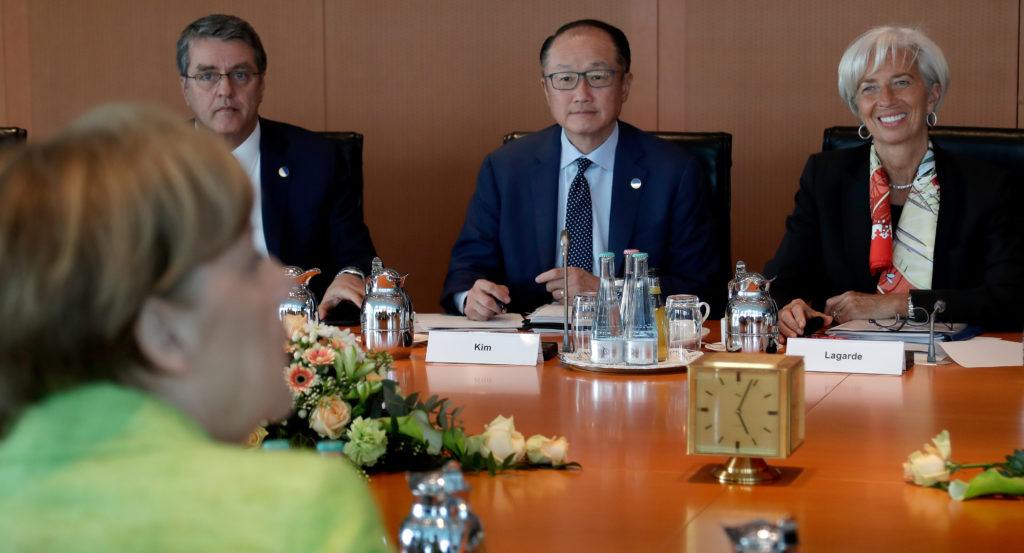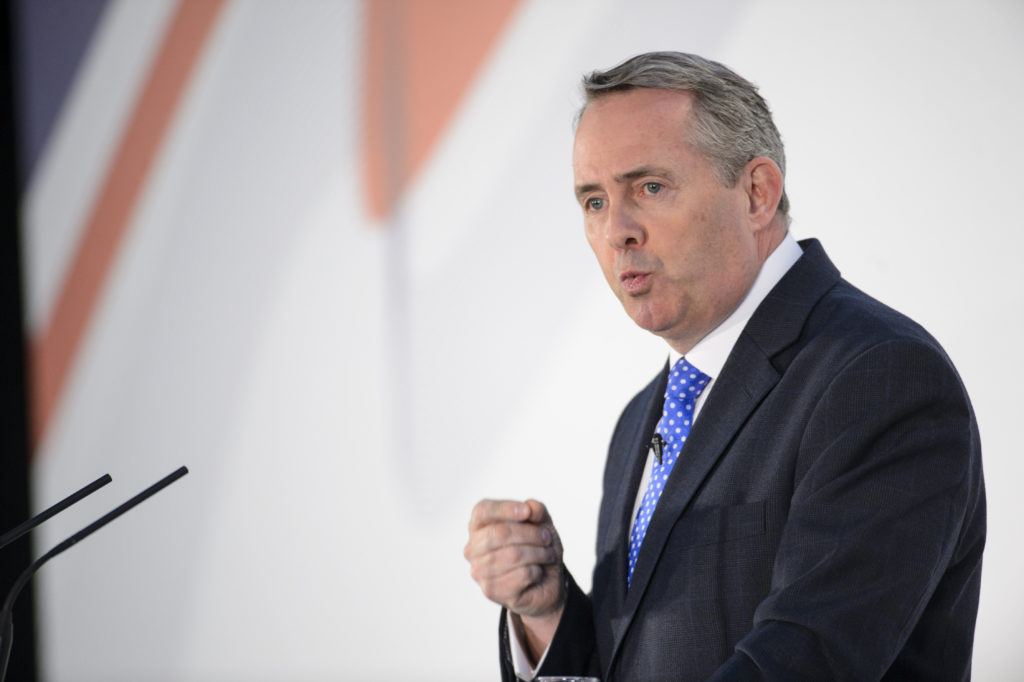
Trading with the European Union under World Trade Organisation rules is ‘perfectly manageable’ for the UK, the world’s leading trade diplomat told me last week. This is an important intervention – one that could impact the UK’s Article 50 negotiations with Brussels.
Having been granted an audience with Roberto Azevedo, I travelled to the WTO’s Geneva Headquarters. Formal interviews with the Director-General are rare – and Azevedo has barely commented on Brexit since the UK’s referendum on EU membership back in June 2016.
Our discussion ranged far and wide…
Does Azevedo think the world is becoming more protectionist – with countries responding to economic difficulties by erecting more trade barriers?
“There is a danger, yes, but we are not there yet.”
Given how fast the weight of global economic activity is shifting eastward, should large multi-lateral organisations like the International Monetary Fund, the World Bank and the WTO, set up by leading Western nations after World War Two, change to reflect new realities?
“It is already happening.”
Replied Azevedo, pointing out that both China and Russia have joined the WTO over the last twenty years. “We are progressively universalising,’ he continued, reminding me that the WTO now has 164 member states, between them accounting for over 95% of international trade. And, of course, Azevedo himself, as a Brazilian in the top job, is a symbol of the on-going transformation of the international regulatory bodies that oversee the global economy.
For my money, the WTO is the most important multi-lateral of them all. Negotiators from all member states congregate in Geneva, permanently arbitrating on trade disputes, under a system of agreed international rules. As such, the WTO is, effectively, the world’s supreme court on trade. Rules are strictly enforced, with nations agreeing to block exports from any member unfairly discriminating against any other. Tariffs are allowed under WTO, but they are generally low, and falling.
This multi-lateral framework has, for decades, checked politicians’ myopic tendencies to use trade barriers against specific competitors for short-term gain – a practice that, history shows, is often reciprocated, sparking mutual escalation, recrimination and deeply damaging trade wars. The WTO, then, acts as an insurance mechanism against global protectionism and commercial conflict.
As such, over the last 70 years, multilateral rules have enabled an enormous expansion of world trade, creating an age of unprecedented commercial cooperation across international borders – and, in relative historic terms, widespread peace. “The WTO’s multilateral system is fundamental,” says Azevedo. “It’s the main core that holds the global trading system together”.
Our conversation moves, inevitably, to Brexit. If Britain fails to strike a no-tariff free trade agreement (FTA) with the EU ahead of March 2019, when scheduled to leave, then UK-EU trade will revert to WTO rules. This scenario has been bitterly criticised by many Parliamentarians determined to frustrate Brexit. Labour MP Chuka Umunna has said “trading with the EU under WTO rules would be disastrous for British firms and jobs”. Liberal Democrat leader Sir Vince Cable warns that the disruption could be “as serious as the [2008] credit crunch”.
The Director-General of the WTO disagrees:
“About half of the UK’s trade is already on WTO terms – with the US, China and several large emerging nations where the EU doesn’t have trade agreements. So it’s not the end of the world if the UK trades under WTO rules with the EU”.

Azevedo acknowledged that an FTA with the EU would be the best outcome for Britain, given that trading under WTO rules would result in some UK-EU tariffs but he remains sanguine:
“If you don’t have a fully-functioning FTA with the EU, there could be rigidities and costs – but it’s not like trade between the UK and EU is going to stop. There will be an impact, but I suppose it is perfectly manageable”.
I wrote up my exchange with Azevedo in detail in last weekend’s Sunday Telegraph. Here, on UnHerd, I’d like to provide more context, emphasising longer-term implications.
Not so disastrous…
To characterise trading under WTO rules as “disastrous” is alarmist and wrong. Having said that, a “bold and ambitious” FTA, keeping UK-EU trade largely tariff free, is obviously the UK’s preference. Theresa May made this clear in her Lancaster House speech of January 2017. But if we don’t secure an FTA with the EU by March 2019, we then charge reciprocal WTO tariffs, averaging some 2 to 3%. This is no way stops UK trade with the EU, as Azevedo has said, gainsaying the doom-mongers. All nations have ‘access’ to the single market, provided regulatory standards are met and that generally low tariffs are paid. The US and China conduct hundreds of billions of dollars of EU trade annually with no FTA. Britain can do the same. We’re well placed to trade with the EU on WTO terms as we’d start with full regulatory compliance.
If trading under ‘WTO rules’ is so bad, how does the UK already sell the majority of its exports beyond the EU – largely under WTO rules? Such non-EU trade generates a surplus and is fast-growing, as oppose to our EU trade which is shrinking and in deep deficit – despite the single market. Britain’s existing trade with the US, our largest single trading partner, is on the basis of WTO rules – not least as the EU, given the often conflicting needs of numerous member states, has failed to agree a US trade deal despite 60 years of trying.
Commercial logic, in the shape of the EU’s £71bn trade surplus with Britain, suggests Brussels should want a UK-EU trade agreement but a desire to ‘punish’ Britain – or the refusal of some sub-regional EU parliamentary outpost to ratify any deal – could prevail. On a purely practical level, therefore, it’s vital that the UK prepares for WTO trade with the EU – making the necessary upgrades to cross-Channel customs clearance, of both physical infrastructure and staff.
This makes strategic sense too. Unless the EU sees Britain is willing not to sign any FTA Brussels puts on the table, we’ll only be offered a bad one. Signing a terrible FTA out of desperation to ‘get a deal’ would disadvantage UK exporters and consumers for years. When Britain joined the European Economic Community in 1973, existing members changed our entry terms at the very last moment, forcing the UK to give up sovereignty over our fishing waters. Similarly today, the UK will only secure an advantageous FTA, and ensure that it isn’t altered to our detriment at the last moment, if we’re willing, ready and able to trade instead under WTO rules.
Once the drama of Brexit is over, beyond March 2019 and any subsequent transition, WTO rules can then be used as a ‘platform’ to cut an FTA with the EU under less time pressure, making a better long-term deal more likely. Some UK firms are worried that WTO rules will hurt ‘complex supply chains’ across the EU. Yet most components are zero-rated for tariffs, even if the goods attract a tariff on final sale. Our EU deficit also means WTO rules will raise several billion pounds in net tariff revenues each year – which can be used to help UK sectors like automotives and agriculture, where EU tariffs are likely be higher.
‘No deal’ – trading with the EU with no FTA – is an entirely coherent position. It is very different from just ‘walking away’ – which means failing to settle administrative issues with the EU such as mutual recognition agreements on each others’ exports. No one is advocating such an approach. It is unthinkable existing and uncontroversial EU protocols granted to countless other non-EU members would not also apply to Britain after Brexit. For Brussels to deny such rights, in a reckless bid to block UK-EU trade altogether, would itself breach WTO and EU treaties, while incensing EU businesses and voters by threatening billions of euros of profit and countless EU jobs.
And when it comes to lurid scare-stories about planes not flying, Europe’s ‘Open Skies’ agreement applies to numerous non-EU nations and those outside the single market. The UK boasts a huge aviation industry, with numerous EU-based airlines using our airports, giving us much leverage. Politicians will beat their chests, and spread fear, but the commercial imperatives to strike new flight deals are mutual and massive. If the details aren’t finalised by March 2019, memorandums of understanding will surely extend current practice until new agreements are reached.
Again, ‘no deal’, in this context, means trading with the EU under WTO rules – the basis on which we already conduct most of our trade with the rest of the world. This is a position we must be publicly willing and able to adopt, if we are ultimately to secure the best post-Brexit EU trading arrangements possible. The EU’s on-going and increasingly blatant intransigence – on everything from citizens’ rights, to the ‘divorce bill’ and the Irish border – highlights why Britain must prepare to operate without an EU FTA, as such a deal may be refused, whatever we do.
It’s good news, then, that Chancellor Philip Hammond, in last week’s budget, committed the funds[1. See Liam Halligan’s contribution to UnHerd’s Budget 2017 blog, “Phil Hammond, Brexiteer“.] to do upgrades to the UK’s customs and security infrastructure, that are needed anyway, and which make us ready to trade with the EU under WTO rules.
‘We know what is going on here’
A few months after the 2016 referendum, the then Liberal Democrat Business Secretary Sir Vince Cable tried to calm fellow delegates at his own party conference who were disappointed the UK had voted for Brexit:
“There are people in the party who don’t accept the outcome, who feel incredibly angry and feel it’s reversible, that somehow we can undo it. The public have voted and I do think it’s seriously disrespectful and politically utterly counterproductive to say ‘sorry guys, you’ve got it wrong, we’re going to try again’ – I don’t think we can do that.”
Cable has now changed his mind, of course. When the Liberal Democrats campaigned on a ‘fight Brexit’ platform during the June 2017 general election, the party’s vote share slumped to an all-time low. Yet in July 2017, when Cable became party leader, he promptly adopted the same second-referendum policy, despite previously stating that it would be “seriously disrespectful” to the electorate.
This volte face by one of the UK’s most respected and thoughtful parliamentarians is indicative of the febrile mood at Westminster, given the uncertainties raised by a hung parliament. Not only in the Commons, but also the Lords, the anti-Brexit lobby is mobilising – with opposition parties sensing their moment could soon arrive.
Cable’s actions illustrate that, when it comes to base politics, carefully reasoned positions and instinctive principals go out of the window. If you can damage your political opponents to the benefit of your party, you adopt the policy position required to do so. The close parliamentary arithmetic since June’s General Election means rational debate has given way almost entirely to blatant opportunism. This is why Azevedo’s intervention is potentially so important.
In her Lancaster House speech, the Prime Minister pledged a parliamentary vote at the end of the Article 50 process. “I can confirm today that the government will put the final deal that is agreed between the UK and the EU to a vote in both Houses of Parliament,” she said. But a strong Remain-supporting lobby in the Lords, then made a concerted attempt to alter the vote offered by May, attempting in March 2017 to amend the legislation to trigger Article 50.
Under the government’s proposal, if Parliament votes against any UK-EU deal, Britain reverts to a default option of trading with the EU under WTO rules, from outside the EU. A group of ultra-Remain peers instead promoted a default option that was somewhat different. Under their amendment, should Parliament choose to reject any UK–EU deal, the UK would then stay in the EU, despite the referendum result of the June 2016 referendum. This amounts, of course, to a Parliamentary veto on Brexit – even though both Houses of Parliament voted strongly in favour of granting the EU referendum and have since both passed Article 50.
As such, a ‘default EU membership’ parliamentary vote would seriously undermine the UK’s negotiating position. If Parliament were able to veto Brexit, EU negotiators – mindful of Britain’s large annual financial contribution and wanting to discourage other nations from seeking to leave – would ensure any deal ultimately offered was so bad as to guarantee public outcry and parliamentary rejection.
A vote that reverts to WTO rules, in contrast, gives the EU an incentive to make the trade aspects of any UK–EU deal beneficial to both sides, mindful that imposing unfair conditions on the UK could result in WTO rules, including tariffs on EU exporters. Powerful European commercial interests would then be incentivised to push for a constructive UK–EU free-trade deal, making a success of our on-going commercial relationship post-Brexit. This is precisely the outcome that the EU, and the pro-EU UK establishment, doesn’t want to happen.
The highly contentious amendment on a vote defaulting to EU membership was tabled in March 2017 by the crossbench peer Lord Pannick – the barrister behind the high-profile Supreme Court case brought by fund manager Gina Miller, which originally forced Theresa May to seek parliamentary approval for triggering Article 50.
Pannick had “a hidden agenda”, according to former Conservative Cabinet minister Lord (Michael) Forsyth:
“I have to say to the noble Lord, we know what he’s up to, we know what is going on here. This House is absolutely full of people who still haven’t come to terms with the result of the referendum and this is a clever lawyers’ confection in order to reverse the referendum result.”
Forsyth is exactly right.
In the end, despite more than seventy hours of parliamentary debate, the 137-word bill triggering Article 50 was eventually passed without amendment. But that was all -re-election. The combination of a hung parliament and the ongoing determination of the Lords’ pro-Remain lobby suggests peers will try once again, over the coming months, to amend a future Brexit-related bill with a ‘binding vote’ amendment, including a ‘revert to EU membership’ clause.
That’s why Parliamentarians determined to stop Brexit – in both the Commons and the Lords – want to paint ‘WTO rules’ as a disaster. Language often linked to this option such as ‘cliff-edge’ and ‘crashing out’, while repeated verbatim by broadcasters, is entirely misleading. It is designed to scare and confuse, preparing the ground for a Parliamentary showdown forcing the government to offer not a vote on accepting any EU deal offered or otherwise reverting to ‘WTO rules’, but instead on whether or not we should leave the EU.

During that battle, the testimony of such an unimpeachable, authoritative source as Roberto Azevedo saying the UK could manage perfectly well under WTO rules could prove extremely important. That’s why, since I published my Telegraphinterview, I’ve been subject to endless abuse on social media – with numerous Brussels-Remain lobbyists calling me “a liar”, casting doubt on the veracity of my reporting, accusing me of tricking Azevedo and even – absurdly – suggesting the WTO Director General “is confused about global trade rules’.
‘No Deal’ deadline
Agreeing no FTA with the EU before March 2019, is an entirely acceptable outcome for the UK – and it would be a major strategic error to think otherwise. Much of the florid language connected to ‘WTO rules’ – the ‘gun to the head option’ is another favourite of ‘Stop Brexit’ campaigners – amounts only to scaremongering, as Azevedo has now confirmed.
His intervention was welcomed by Liam Fox, International Development Secretary:
‘Far from the doomsday predictions given by some, if the UK trades under WTO rules with the EU, as Roberto Azevedo has said, that will be perfectly workable. While we clearly want a free-trade agreement with our friends in the EU, using WTO rules is entirely manageable”.
Dr Fox said that after Brexit, the UK will benefit from operating independently within the WTO, the result of no longer having to conduct trade policy as a member of the EU:
“My department is a firm supporter of the WTO and, as Britain becomes an independent trading nation once again, we will be one of the world’s strongest advocates for further trade liberalisation and modernisation.”
It is, then, by no means ‘a disaster’, to leave the EU with no FTA in place. This is a perfectly acceptable – and, in my view, given the EU’s bullheaded approach so far, it is now probably the most likely outcome. That’s why the government should very soon set a “no deal” deadline for the middle of 2018, after which the focus of the UK’s attention will switch from trying to negotiate an FTA with the EU to all the other aspects of departure that must be agreed, not least the various protocols required to trade under WTO rules.










Join the discussion
Join like minded readers that support our journalism by becoming a paid subscriber
To join the discussion in the comments, become a paid subscriber.
Join like minded readers that support our journalism, read unlimited articles and enjoy other subscriber-only benefits.
Subscribe